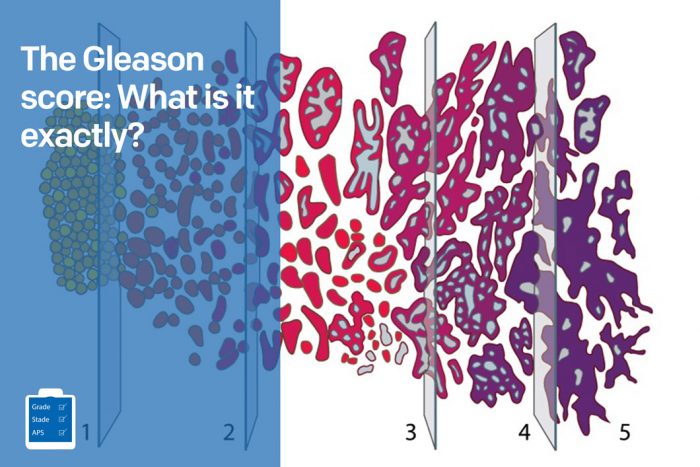The grade and stage of prostate cancer greatly influence the choice of treatment. Both indicators reveal the progression of the disease. The grade refers to the degree of aggressiveness of prostate cancer while the stage refers to the degree of spread of cancer cells. This article will focus on the concept of grade, more specifically on the Gleason score. The stage of prostate cancer will be discussed in a future article.
Gleason score
The Gleason score is the grading system most widely used for prostate cancer. This scale, developed in 1966 by Dr. Donald F. Gleason of the University of Minnesota, assesses the aggressiveness of the prostate cancer.
During the biopsy, the pathologist evaluates the tumor tissue and compares it to normal prostate tissue. He then grades the degree of abnormality of the collected tissue on a scale from 1 to 5. The lower the number (grade 1 or 2), the more the cancer cells appear normal. The higher the number (grade 4 or 5), the more cancer cells appear abnormal and irregular. Grade 3 represents an intermediate condition.
By cause of the low homogeneity of the prostate gland, the degree of aggressiveness of cancer may vary depending on the different areas of the tissue. Thus, the pathologist assigns a grade from 1 to 5 for the 2 most common types of glandular growth patterns within the tumour. The 2 grades are added together to get the Gleason score
It is important to consider the order of the grades: the first number represents the predominant grade. For example, the degree of aggressiveness of cancer will be lower for a subject with grades of 3 + 4 (Gleason score 7) as opposed to a subject with grades of 4 + 3 (Gleason score 7). In cases where the pathologist observes only one dominant grade, he still adds two (for example, 4 + 4 for a score of 8).
Generally, high grades and scores correspond to a more aggressive and rapidly growing tumour. The Gleason score can, therefore, be an important element in the doctor’s recommendation to proceed with aggressive treatment, such as a radical prostatectomy.
Discover our new animated videos
Discover three new animated videos, each equally unique and original from one to the other. Be on the lookout!
Here is the second one – Diagnosis and Treatment
Take the time to visit each of our pages on this website, as well as our YouTube channel, in order to get familiar with the disease with our expert lectures, our section on available resources, the support that is offered to you.
Do you have any questions or concerns? Above all, do not hesitate. Contact us at 1 855 899-2873 to discuss with a nurse specializing in uro-oncology. It’s simple and free, like all our services.
Pages of our site that might interest you
Want to know more? Just click on one of the links below.
Coping with cancer
Support for you
One-click resources
PROCURE news that may interest you
Each week, we publish a blog article. Here are a few for you.
Did you say prostate cancer?
What Happens After My Diagnosis of Prostate Cancer?
Written by PROCURE. © All rights reserved – 2020




